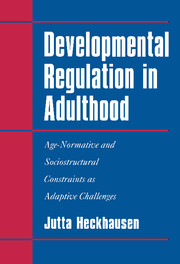 Developmental Regulation in Adulthood
Developmental Regulation in Adulthood Book contents
- Frontmatter
- Contents
- Acknowledgments
- List of Tables and Figures
- Introduction
- 1 Selectivity and Failure Compensation as Fundamental Requirements of Human Behavior and Development
- 2 The Life Course as a Context of Action
- 3 Primary and Secondary Control across the Life Span
- 4 A Model of Developmental Regulation across the Life Span
- 5 Developmental Goals as Organizers of Developmental Regulation
- 6 Developmental Regulation in Different Life-Course Ecologies
- 7 Social Comparisons as Prototypical Strategies in Developmental Regulation
- 8 Conclusions and Prospects for Future Research
- References
- Name Index
- Subject Index
2 - The Life Course as a Context of Action
Published online by Cambridge University Press: 05 September 2009
- Frontmatter
- Contents
- Acknowledgments
- List of Tables and Figures
- Introduction
- 1 Selectivity and Failure Compensation as Fundamental Requirements of Human Behavior and Development
- 2 The Life Course as a Context of Action
- 3 Primary and Secondary Control across the Life Span
- 4 A Model of Developmental Regulation across the Life Span
- 5 Developmental Goals as Organizers of Developmental Regulation
- 6 Developmental Regulation in Different Life-Course Ecologies
- 7 Social Comparisons as Prototypical Strategies in Developmental Regulation
- 8 Conclusions and Prospects for Future Research
- References
- Name Index
- Subject Index
Summary
The main purpose of this chapter is to discuss external constraints upon individuals' developmental regulation. Such external constraints include biological and sociostructural factors as well as age-normative conceptions commonly shared in a given society. The stage for a discussion of these phenomena is set by developing the conceptual framework of life-span developmental psychology. A more specific discussion of age-related constraints to developmental regulation across the life course follows in terms of a brief sketch of biological-genetic factors, a consideration of the main types of sociostructural influences, and an elaborate discussion of age-normative conceptions. In this chapter, external constraints to developmental regulation are discussed, not only as restrictive factors, but as a functional and indisposable scaffold that provides time-structured opportunities for developmental regulation across the life course.
For the human species the variability of behavior is substantial, both interindividually and intraindividually across life-course changes. This implies greatly enhanced opportunities, but it also brings about the necessity to select from the many options in terms of choosing a particular track and then staying focused on it (see Chapter 1). This selectivity requirement cannot be managed by the individual herself. The task of choosing and maintaining focus on one path from a completely unstructured pool of behavioral options would be overwhelming.
- Type
- Chapter
- Information
- Developmental Regulation in AdulthoodAge-Normative and Sociostructural Constraints as Adaptive Challenges, pp. 19 - 61Publisher: Cambridge University PressPrint publication year: 1998


